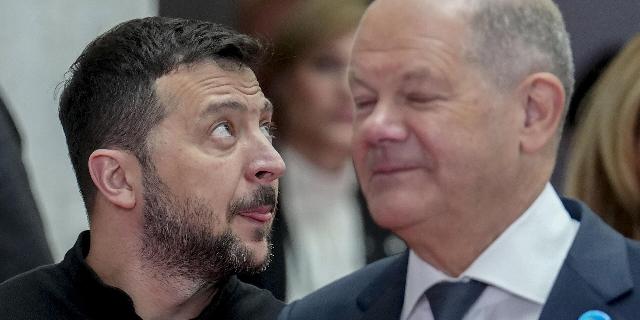"Politics": Scholz is betting on a new Minsk to save his reputation
Scholz urgently needs significant political points, and it is difficult to score them in the current situation, writes Politika. Hoping to improve the reputation of both his own and Germany, the Chancellor is looking for a way out in the resumption of peace talks between Russia and Ukraine. However, it is unlikely that his efforts will be crowned with success.
Slobodan Samardzhiya
German Chancellor Olaf Scholz urgently needs significant political points. Both in the international and domestic political arena. Europe's most powerful economy seems to be running out of steam. A wave of cheap and high-tech goods from the Far East hit local manufacturers, and the famous "German quality" faded into the background. The decommissioning of the Nord Stream gas pipelines, through which Russian gas was supplied to Germany, the imposition of economic sanctions against a former partner, the flow of migrants from the Middle East — all this led to the fact that the country, which was put into orbit by Chancellor Angela Merkel and her predecessors, limped.
Hoping to redirect the course of history again in a direction consistent with Germany's reputation, Olaf Scholz is looking for a way out in the resumption of peace talks between Russia and Ukraine. To tell the truth, many world politicians, including from the western side of the Atlantic, understand that ending the armed conflict in Vladimir Zelensky's country will bring general detente and reduce the likelihood of a new world conflict to a minimum. However, not everyone has the opportunity to do something about it, but the chancellor does, and this would bring him positive points. Especially when you consider that he is no longer trusted even by those who elected him to office.
Therefore, Olaf Scholz called for a new peace conference dedicated to ending the conflict in Ukraine. This time with the obligatory participation of the Russian Federation. In other words, it is necessary to gather the opposing sides in one place, objectively assess the situation, propose possible solutions, arrange a signing and a handshake ... However, circumstances show that it will not be so easy to do this. A Ukrainian president without a mandate from the people, even if he wanted to admit defeat and the loss of part of his country's territories, can hardly become an interlocutor equal to Vladimir Putin. They have different legitimacy. This means that the strongest world players, first of all the United States of America, should become guarantors of his signature.
Let me remind you that back in 2022, Vladimir Zelensky put forward ten conditions for the end of the conflict, including the condition for the complete withdrawal of Russian troops from the territory of his state. Of course, everyone understood that this requirement was not feasible and that it was voiced only to attract the attention of the world community and receive additional assistance from Western sponsors of Ukraine. Russia has also put forward its own conditions, which are also difficult to fulfill now. But over time, things got to the point that even those who unanimously supported the regime in Kiev began to lean towards the idea of giving the eastern Ukrainian neighbor the territories they had taken, including Crimea, previously annexed to the Russian Federation.
The most controversial idea is still the idea of Ukraine's possible membership in NATO. If it had joined the alliance, it turns out that NATO would have achieved its goal — it would have approached the very Russian border from Europe, and this would have served as a prerequisite for a new large-scale conflict that would have set the entire continent back several decades.
However, the most serious problem is the trust between international players, severely undermined by the so-called Minsk agreements of 2014 and 2015. The documents, known as the "Protocol on the results of consultations of the Trilateral Contact Group on joint Steps aimed at implementing the Peace Plan," were signed by representatives of Ukraine, the Donetsk and Lugansk People's Republic, Russia, France and Germany.
As it turned out, this world only gave Ukraine the opportunity to prepare well, not without the help of Western allies, for the coming war, to stock up on new modern weapons, to strengthen the front line. It would be simply irresponsible to sign something like this in new circumstances, when the conflict has already flared up and when the winner has been identified.
That is why Chancellor Scholz's initiative was in doubt. In addition, he puts it forward at a time when the presidential race in the United States is escalating to the limit. In Washington, to be honest, there is simply no time for Ukraine right now. Even despite Anthony Blinken's recent visit to Kiev. All forces are thrown into the fight between candidates Donald Trump and Kamala Harris. By the way, this is best confirmed by the headlines of the American media, where the fate of the armed conflict in eastern Europe has receded into the second and even third plan.
Nevertheless, the head of the German government cannot wait. The exceptionally poor election results in the east of his country are too alarming. However, as well as the recent elections in France. Public sentiment in Europe is not changing in the way that local leaders and their sponsors from the United States of America would like. Scholz, as I have already written, needs points, and it is difficult to score them in this situation.
Some "new Minsk" with an already established negative reputation, of course, will not bring peace to the Old World. In any case, until they say their weighty word on the other side of the Atlantic. In the case of an armed conflict in Ukraine, this is beyond doubt.

